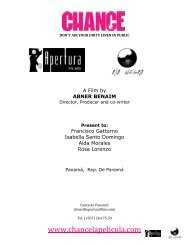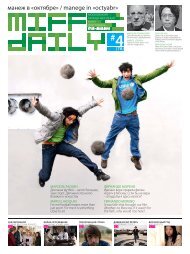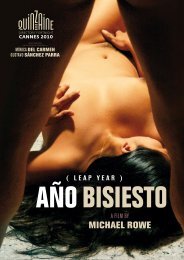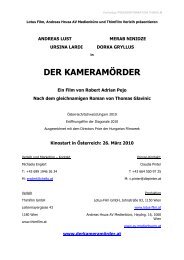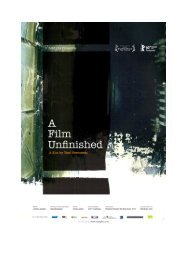манеж в «октябре» / manege in «octyabr» - Московский ...
манеж в «октябре» / manege in «octyabr» - Московский ...
манеж в «октябре» / manege in «octyabr» - Московский ...
Create successful ePaper yourself
Turn your PDF publications into a flip-book with our unique Google optimized e-Paper software.
Mood Indigo/<br />
L’Écume des Jours<br />
FILMS AROUND THE WORLD<br />
Dir. Michel Gondry<br />
Michel Gondry’s “Mood Indigo” is the third screen version of<br />
the famous novel by Boris Vian. The material seems perfect for<br />
a visionary director. Everyth<strong>in</strong>g that was previously provoked<br />
on the screen by Gondry’s imag<strong>in</strong>ation can now be found <strong>in</strong> Vian’s<br />
polished, honed text. The script co-written with Luc Bossi<br />
is very close to the literary source. The simple and at the same<br />
time burlesque plot is visualized with the help of technologies<br />
which are dear to the heart of the director as childhood memories.<br />
The result was unexpected: animation and other computer<br />
twists added a t<strong>in</strong>ge of archaism to the heart-wrench<strong>in</strong>g (<strong>in</strong><br />
the words of Raymond Queneau) love story of 1947. Vian’s<br />
play with words, his dreamy lyricism, <strong>in</strong>tellectual pass-times<br />
filled with black humor (which does not preclude sparkles of<br />
p<strong>in</strong>k syrup (novels <strong>in</strong> the “p<strong>in</strong>k series”) were transformed or<br />
rather turned by Gondry <strong>in</strong>to the deja-vu of quilt genres: from<br />
spectacular to sketches, from fairy-tales (or Utopia) to horror<br />
with an ironic t<strong>in</strong>ge of simple-heartedness.<br />
An unexpected mishap transpired. Vian’s novel which may<br />
be <strong>in</strong>terpreted (and it looks like that is the case) as a precursor<br />
to post-modern writ<strong>in</strong>gs, looks like an echo or belated<br />
homage to the past epoch when <strong>in</strong>terpreted by Gondry. The<br />
director rema<strong>in</strong>ed true to this epoch stylistically.Vian’s virtuoso<br />
escapades, his neologisms, his transformations of th<strong>in</strong>gs<br />
like “pianocktail” (a melody played on this musical <strong>in</strong>strument<br />
determ<strong>in</strong>es the contents of the cocktail), his sardonic<br />
anticipation of the fashion for newsmakers called at the time<br />
Jean-Saul Partre were reworked by Gondry <strong>in</strong>to comedic<br />
textures, mechanisms, puppet characters. Like the mouse liv<strong>in</strong>g<br />
<strong>in</strong> Col<strong>in</strong>’s (Roma<strong>in</strong> Duris) house. It seems to have appeared<br />
not even from a Pixar movie but from some production of a<br />
Lipetsk Theatre for Young Viewers. Another character called<br />
Chick is crazy about Partre (Sartre) and uses all that rema<strong>in</strong>s<br />
of his own and other people’s money to buy his writ<strong>in</strong>gs. In<br />
Gondry’s movie Partre appears <strong>in</strong> 3D glasses like an animation<br />
star character with hordes of <strong>in</strong>sane fans. The guru is killed by<br />
Chick’s lover, who rema<strong>in</strong>s true to the orig<strong>in</strong>al. It is her who<br />
sets fire to the bookstores display<strong>in</strong>g the philosopher’s books,<br />
that her lover is crazy about, and dies herself, but before her<br />
death she has time – and it is Gondry’s <strong>in</strong>vention – to wrench<br />
out Partre’s heart, which turns out to be a fried chicken. And<br />
still what <strong>in</strong>terests the director is not a parody of the <strong>in</strong>tellectual<br />
moods of the epoch, although “countess De Beauvoir” is shown<br />
almost like a priestess. Gondry bursts with laughter when<br />
he changes angles and proportions of his characters – of the<br />
qua<strong>in</strong>t cook Nicolas (Omar Sy) who pulls eels right out of the<br />
water tap and feeds them with p<strong>in</strong>eapples. Or when shoe laces<br />
of Col<strong>in</strong>’s boots start hurriedly hav<strong>in</strong>g a life of their own, <strong>in</strong>dependent<br />
from their romantic master who has fallen <strong>in</strong> love with<br />
Chloe (Audrey Tautou), who has a water-lily grow<strong>in</strong>g <strong>in</strong> her<br />
lung (as Vian’s surrealist whimsy would have it) and perishes<br />
like a pr<strong>in</strong>cess. This is the po<strong>in</strong>t when the ordeal starts for Col<strong>in</strong><br />
who was once cheerful and rich but has spent all his money on<br />
the books by Partre and flowers and medic<strong>in</strong>e for his wife. The<br />
means for “existence”, as Vian’s Jean-Saul used to say. As for<br />
Gondry, he immerses himself <strong>in</strong> the pictures of twilight milieu<br />
where his characters f<strong>in</strong>d themselves. Those who remember<br />
the novel, will recall that after Chloe’s illness it started to shr<strong>in</strong>k<br />
around the characters, gett<strong>in</strong>g imbued with the smell, color<br />
and other signs of decay.<br />
In this way Gondry, who has a weakness for dreamy,<br />
skewed reality favoured by Vian, satisfied his appetite <strong>in</strong> this<br />
simple-hearted treatment of “Mood Indigo”.<br />
Zara Abdullaeva<br />
The Dark Matter<br />
of Love<br />
DOCUMENTARY COMPETITION<br />
Dir. Sarah McCarthy <br />
In the open<strong>in</strong>g shots a relatively young scientist uses a monkey<br />
to expla<strong>in</strong> the basics of his work. He conducts experiments<br />
– not medical, but psychological – and watches an orphaned<br />
baby chimpanzee rega<strong>in</strong><strong>in</strong>g the feel<strong>in</strong>g of love once aga<strong>in</strong>. Next<br />
the director cuts to the <strong>in</strong>teriors of a contemporary orphanage<br />
<strong>in</strong> Archangelsk. It seems the chimpanzee existed <strong>in</strong> better<br />
conditions: a grey panel five-story build<strong>in</strong>g, an abandoned car<br />
with broken w<strong>in</strong>dows <strong>in</strong> front of it, a deserted playground. The<br />
<strong>in</strong>teriors are clean and poor like <strong>in</strong> Soviet hospitals. It is here<br />
that the Diazes from the USA come to take their adopted children:<br />
the husband, the wife and their own daughter Cami. They<br />
<strong>in</strong>tend to adopt two brothers of some five years of age and an<br />
older eleven-year-old girl Masha.<br />
All three children are absolutely healthy physically as well<br />
as mentally. Consider<strong>in</strong>g how smoothly all the prelim<strong>in</strong>ary<br />
meet<strong>in</strong>gs went no serious problems should arise. But problems<br />
do arise already on the plane. Masha is glued to the illum<strong>in</strong>ator<br />
and takes no notice of what is go<strong>in</strong>g on around her.<br />
Only <strong>in</strong> response to the cameraman’s request she unwill<strong>in</strong>gly<br />
turns, forces a smile and raises her thumb.<br />
The adjustment does not go smoothly for the younger<br />
brothers either. The foster parents do not know a word of<br />
Russian, the boys do not speak English and so even the<br />
simplest request about soap bubbles turns <strong>in</strong>to an <strong>in</strong>surmountable<br />
problem. But the situation with Masha is much<br />
more complicated. She is uncommonly mature for her eleven<br />
years and feels ill-at-ease <strong>in</strong> the foster home. She won’t smile<br />
for the general photo. She won’t play with other children. She<br />
won’t sit with everybody at the same table. Her new parents’<br />
talk about love seems artificial to her. She has so thoroughly<br />
forgotten what love is that she does not believe a s<strong>in</strong>gle word.<br />
Only out of habit she agrees with everyth<strong>in</strong>g, try<strong>in</strong>g to look<br />
merry and relaxed. And here we aga<strong>in</strong> cut to the scientist<br />
specializ<strong>in</strong>g <strong>in</strong> the adjustment of children to their new<br />
families. Now he is grey-haired, accompanied by his youngish<br />
assistant. Without <strong>in</strong>terfer<strong>in</strong>g <strong>in</strong>to the educational process he<br />
analyses the video material giv<strong>in</strong>g advice to parents, not to<br />
children.<br />
The film is divided <strong>in</strong>to four parts accord<strong>in</strong>g to the seasons.<br />
The Diazes spent the Autumn under constant pressure. In<br />
W<strong>in</strong>ter new problems were added on top of the old ones:<br />
their own daughter Cami suffered because for the first time<br />
<strong>in</strong> her life she had to share her parents’ attention with other<br />
children. In Spr<strong>in</strong>g the first signs of warmth appeared and <strong>in</strong><br />
Summer there was almost total harmony.<br />
The ma<strong>in</strong> special effect here is the look of these adopted<br />
children. The real magic lies <strong>in</strong> the way they coped with their<br />
situation almost without any impetus from the adults. First<br />
they got <strong>in</strong>to a seem<strong>in</strong>gly hopeless plight. (Life <strong>in</strong> America is<br />
not a bed of roses, go<strong>in</strong>g back to Rмussia is impossible and<br />
po<strong>in</strong>tless). Then gradually, imperceptibly the children found<br />
the way out of their psychological crisis. The simplest homemade<br />
postcard for the mother’s or father’s birthday seemed<br />
an unatta<strong>in</strong>able miracle. A year later the three of them look<br />
like real Americans. They speak English almost without any<br />
accent. They come first <strong>in</strong> runn<strong>in</strong>g competitions and s<strong>in</strong>g<br />
primo <strong>in</strong> the school clubs.<br />
Only months after the film was completed the State Duma<br />
passed the law forbidd<strong>in</strong>g Americans to adopt Russian children.<br />
This makes even more acute the mixed feel<strong>in</strong>g of bitterness<br />
and elation aroused by the film. We feel hurt because<br />
no one needed these smart handsome children <strong>in</strong> their native<br />
country. And we feel happy because of the opportunities that<br />
are open to them <strong>in</strong> the USA. The opportunities that have<br />
been given to them not by the state with all its social <strong>in</strong>stitutions<br />
but by the selfless love of actual people.<br />
Nikita Kartsev<br />
Exploration<br />
of conf<strong>in</strong>ement<br />
SHORT FILM COMPETITION<br />
Dir. Marusya Syroechkovskaya,<br />
Gleb Nechaev <br />
- How did you get this idea to film people who found<br />
themselves hostages of the most absurd situations?<br />
Marusia Syroechkovskaya: Once I got entangled <strong>in</strong> a<br />
polo-neck sweater while I was putt<strong>in</strong>g it on. The situation<br />
seemed amus<strong>in</strong>g, somehow silly: you can’t see anyth<strong>in</strong>g,<br />
you feel helpless. I started to imag<strong>in</strong>e what would happen<br />
<strong>manege</strong> <strong>in</strong> <strong>«octyabr»</strong><br />
if I could not disentangle myself and stayed <strong>in</strong> this strange<br />
state of isolation. This is how the project was born. Then I<br />
started <strong>in</strong>vent<strong>in</strong>g other characters and imag<strong>in</strong><strong>in</strong>g, where<br />
they could be stuck.<br />
- The movie opens with a Youtube video about a girl<br />
who gets stuck <strong>in</strong> a refuge chute. Is it <strong>in</strong>vented too?<br />
Marusia Syroechkovskaya: No it is not. I came across<br />
it at approximately the same time. The girl really got<br />
stuck <strong>in</strong> the garbage chute. She is not alone, there are<br />
many of them, they often get stuck there. Sometimes<br />
people crawl <strong>in</strong>to the chute themselves, perhaps they<br />
have lost someth<strong>in</strong>g there or want to slide down to<br />
the first floor. I don’t know what reasons they have.<br />
We haven’t got a garbage chute at home so we did not<br />
conduct any experiments.<br />
- You have an episode where Gleb is try<strong>in</strong>g to<br />
descend <strong>in</strong>to the garbage shaft himself.<br />
Gleb Nechayev: It took us very long to f<strong>in</strong>d this house.<br />
In summer we were <strong>in</strong> the town of Shakhty and there was<br />
a desperate shortage of houses with garbage chutes.<br />
Marusia Syroechkovskaya: We just happened to go<br />
to the USA for the summer, I have a boyfriend there and<br />
I thought it would be a challenge to go to the country<br />
where you don’t know anybody and try to make a movie.<br />
There was not much money anyway, so it did not really<br />
matter where to look for like-m<strong>in</strong>ded people. I wanted to<br />
feel the place, the people, the culture, to make the most<br />
of my <strong>in</strong>tuition.<br />
- So “Exploration of conf<strong>in</strong>ement” reflects your<br />
impressions of the USA <strong>in</strong> which you, perhaps, also<br />
got lost?<br />
Marusia Syroechkovskaya: Well, yes, it looks like<br />
that. But on the whole I th<strong>in</strong>k this is a film about the<br />
state of calmness and happ<strong>in</strong>ess. When you are happy,<br />
you start to gradually decompose and also you are<br />
terrified of los<strong>in</strong>g your happ<strong>in</strong>ess. You savor this state<br />
when everyth<strong>in</strong>g goes well. You lock yourself up <strong>in</strong> your<br />
own small world, shutt<strong>in</strong>g out the <strong>in</strong>sane amount of<br />
<strong>in</strong>formation that assaults you every day. You shut out<br />
various cataclysms and stresses. Everybody does it one<br />
way or the other. I wanted to make a movie about just this<br />
escape.<br />
- Gleb, what was your role?<br />
Gleb Nechayev: Marusia is the screenwriter, I merely<br />
helped her when we were still imag<strong>in</strong><strong>in</strong>g various<br />
possibilities. I sat <strong>in</strong> empty bars with friends dream<strong>in</strong>g<br />
up situations where one could get stuck. People were<br />
beg<strong>in</strong>n<strong>in</strong>g to avoid us because the moment we got<br />
acqua<strong>in</strong>ted we started nagg<strong>in</strong>g them about the places<br />
where they could get stuck and where they would prefer<br />
to get stuck should they have a choice.<br />
Marusia Syroechkovskaya: And we were constantly<br />
search<strong>in</strong>g for those who would agree to act <strong>in</strong> our<br />
movie. Everyone on the screen is either an acqua<strong>in</strong>tance<br />
or an acqua<strong>in</strong>tance of an acqua<strong>in</strong>tance. We managed<br />
to f<strong>in</strong>d some of them through free advertisements <strong>in</strong><br />
newspapers.<br />
- My favorite character is the one with his leg <strong>in</strong><br />
the bucket. As far as I understand, Marusia’s favorite<br />
episode is the one about the polo-neck sweater. And<br />
what about Gleb?<br />
Gleb Nechayev: They are all so <strong>in</strong>terest<strong>in</strong>g. I can’t really<br />
select one. As of today… I would get stuck <strong>in</strong> the bed, <strong>in</strong><br />
the blanket.<br />
Marusia Syroechkovskaya: In the blanket cover! That<br />
is a great idea! One could get perfectly stuck <strong>in</strong> the blanket<br />
cover.<br />
Gleb Nechayev: Actually the shoot<strong>in</strong>g looked more<br />
like merry-mak<strong>in</strong>g: it was like our jo<strong>in</strong>t course work, we<br />
all studied <strong>in</strong> Moscow at the moment. We had enough<br />
time, we laughed a lot, learnt a lot about ourselves and<br />
about our future and we did not worry much about the<br />
deadl<strong>in</strong>es.<br />
Marusia Syroechkovskaya: The only trouble was<br />
that it was very hot, it was July. And when it is hot I start<br />
melt<strong>in</strong>g and it can probably be seen <strong>in</strong> the movie.<br />
- Did you edit it <strong>in</strong> hot weather too?<br />
Marusia Syroechkovskaya: No, the edit<strong>in</strong>g was done<br />
at the end of summer, <strong>in</strong> August. And I did the f<strong>in</strong>al cut <strong>in</strong><br />
Moscow. Where I could th<strong>in</strong>k clearly.<br />
Interviewed by Nailya Golman



